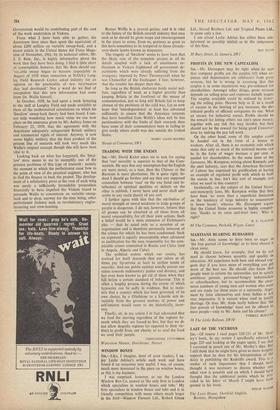POLYMORPHS FOR PASSENGERS Sta,—Arising from Oliver Stewart's article 'Poly- morphs
for Passengers,' it was in May, 1958, not 1952, that I first raised Dr. Barnes Wallis's 'Swallow' project in the House of Commons, though my in- terest had begun in the summer of 1957.
Looking through my files dealing with the mat- ter, I find that on January 13, 1959, Mr. Sandys, who was then Minister of Defence, assured me that so long as the achievements of the industry justified it, the Government would 'continue to make a financial contribution to aeronautical research in the field of civil transport, where this is not already covered, by the research necessary for defence pur- poses.' He went on to refer specifically to the 'Swal- low' project and said that it was 'still in the re- search stage and further work is necessary before its potentialities can be fully assessed.'
He then mentioned what, five weeks later, Mr. Aubrey Jones as Minister of Supply was to confirm in the House: namely the agreement with the United States authorities and with Vickers for a joint re- search programme designed to prove the poten- tialities and the practicability of the 'Swallow' con- cept of variable geometry. He added that the Government would be contributing part of the cost of the work undertaken at Vickers, From what I have been able to gather, the Americans have since then spent the equivalent of about £200 million on variable sweep-back, and a recent article in the United States Air Force Maga- zine of November, 1961, by its technical editor, Mr. J. S. Butz, Jnr., is highly informative about the work that they have been doing. I find it little short of contemptible, however, that Mr. Butz should say, 'vat:able sweep began to become respectable in August of 1959 when researches at NASA's Lang- ley Field Research Center asked industry for an opinion on the practicality of new information they had developed.' Not a word do we find of recognition that this new information had come from Dr. Wallis himself.
In October, 1958, he had spent a week lecturing to the staff at Langley Field and made available to them all the mathematical calculations on which his 'Swallow' sweep-back theory had been based. I can- not help wondering how much value we can now place on the assurance given by Mr. Aubrey Jones on February 23, 1959, that the agreement with the Americans adequately safeguarded British military and commercial rights of interest. Anyway, it now seems highly unlikely that the final product of the present line of research will look very much like Wallis's original concept though this will have been vital to it.
Looking back on what has happened, the 'Swal- low' story seems to me to exemplify one of the greatest problems of this type of research: namely the moment at which• the perfectionist must bow to the point of view of the practical engineer, who has to find the finance to back the project. The develop- ment of a satisfactory pivot at the root of each wing was surely a sufficiently formidable proposition financially to have impelled the Vickers board to persuade Wallis to concentrate on variable sweep- back and to drop, anyway for the time being, other perfectionist features such as revolutionary engine- mounting and crew-housing. Barnes Wallis is a proved genius, and it is vital to the future of the British aircraft industry that men such as he should be given scope and encouragement in the years to come. Even so, geniuses as great as this have sometimes to be tempered to those already- over-shorn lambs known as taxpayers.
The tragedy of 'Swallow' seems to have been that the likely cost of the complete project in all its details coupled with a lack of unanimous en- thusiasm in Vickers frightened off government de- partments which were already suffering from the stringency imposed by Peter Thorneycroft when he was Chancellor of the Exchequer. I fear, however, that the trouble lies deeper than this.
So long as the British electorate holds social wel- fare, regardless of need, as a higher priority than keeping Britain in the forefront of the means of communication, just so long will Britain fail to keep abreast of the problems of the cold war. Let us now hope that 'interdependence' at least has advanced sufficiently to ensure that the American interests that have benefited from Wallis's ideas will be less parsimonious with the fruits of their research than have some of their commentators been in failing to give credit where credit was d,ue outside the United States.
HARRY LEGGE-ROURKE
House of Commons, SW1







































 Previous page
Previous page